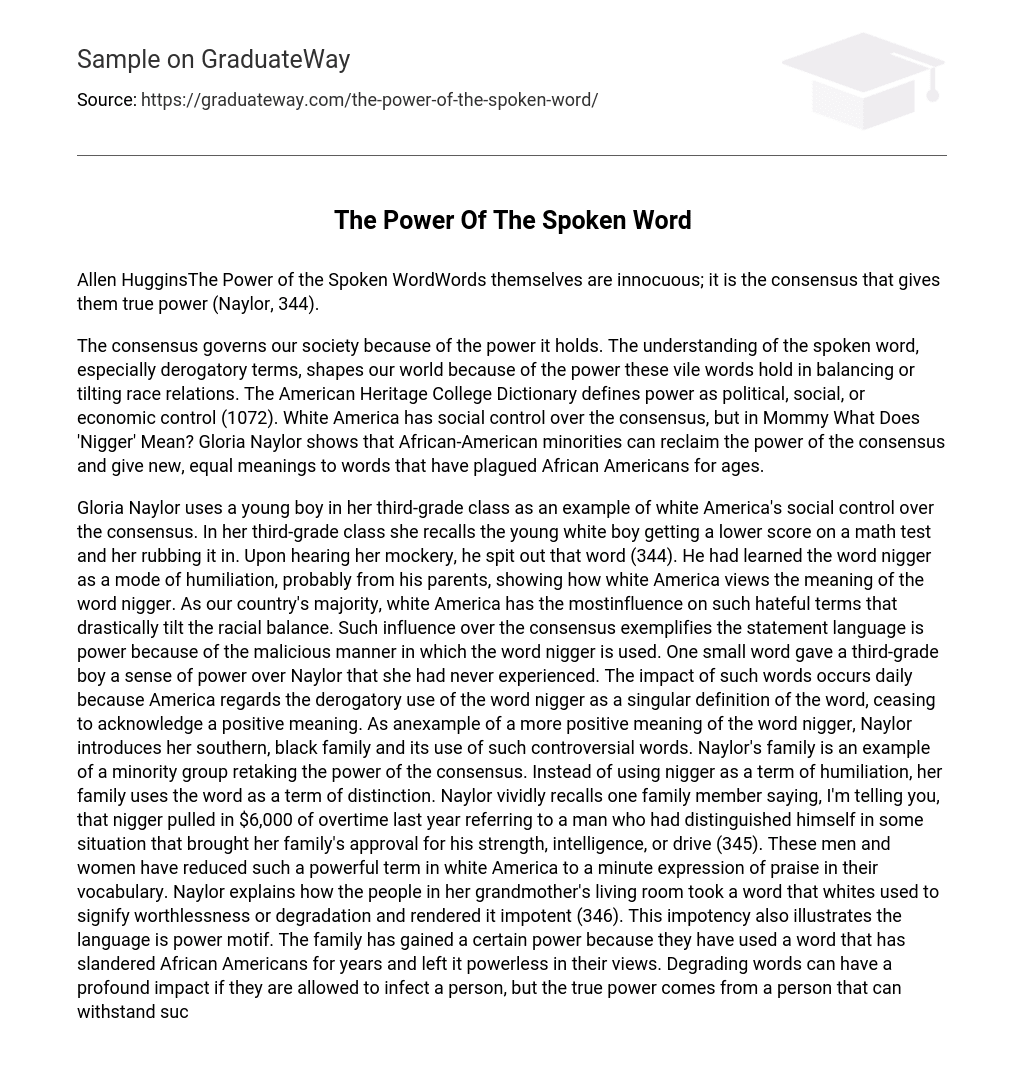Words themselves are innocuous; it is the consensus that gives them true power (Naylor, 344). The consensus governs our society because of the power it holds. The understanding of the spoken word, especially derogatory terms, shapes our world because of the power these vile words hold in balancing or tilting race relations. The American Heritage College Dictionary defines power as political, social, or economic control (1072).
White America has social control over the consensus, but in Mommy What Does ‘Nigger’ Mean? Gloria Naylor shows that African-American minorities can reclaim the power of the consensus and give new, equal meanings to words that have plagued African Americans for ages. Gloria Naylor uses a young boy in her third-grade class as an example of white America’s social control over the consensus. In her third-grade class she recalls the young white boy getting a lower score on a math test and her rubbing it in.
Upon hearing her mockery, he spit out that word (344). He had learned the word nigger as a mode of humiliation, probably from his parents, showing how white America views the meaning of the word nigger. As our country’s majority, white America has the mostinfluence on such hateful terms that drastically tilt the racial balance. Such influence over the consensus exemplifies the statement language is power because of the malicious manner in which the word nigger is used. One small word gave a third-grade boy a sense of power over Naylor that she had never experienced.
The impact of such words occurs daily because America regards the derogatory use of the word nigger as a singular definition of the word, ceasing to acknowledge a positive meaning. As anexample of a more positive meaning of the word nigger, Naylor introduces her southern, black family and its use of such controversial words. Naylor’s family is an example of a minority group retaking the power of the consensus. Instead of using nigger as a term of humiliation, her family uses the word as a term of distinction. Naylor vividly recalls one family member saying, I’m telling you, that nigger pulled in $6,000 of overtime last year referring to a man who had distinguished himself in some situation that brought her family’s approval for his strength, intelligence, or drive (345).
These men and women have reduced such a powerful term in white America to a minute expression of praise in their vocabulary. Naylor explains how the people in her grandmother’s living room took a word that whites used to signify worthlessness or degradation and rendered it impotent (346). This impotency also illustrates the language is power motif.
The family has gained a certain power because they have used a word that has slandered African Americans for years and left it powerless in their views. Degrading words can have a profound impact if they are allowed to infect a person, but the true power comes from a person that can withstand such remarks and render them worthless.
Although Naylor is able to show a minority retaking the power of the consensus, the fact remains that racial relations in our society are vastly separated because of the majority’s consensus and the power it allows the majority to claim. Naylor states, If the word nigger was to totally disappear from the mouths of even the most liberal of white society, no one in that room was nave enough to believe it would disappear from white minds (346). White America needs to realize that harmful words can only hurt our country and detract from its potential. Equality would create endless avenues our country could travel, yet without it, our country will only be able to go so far.





